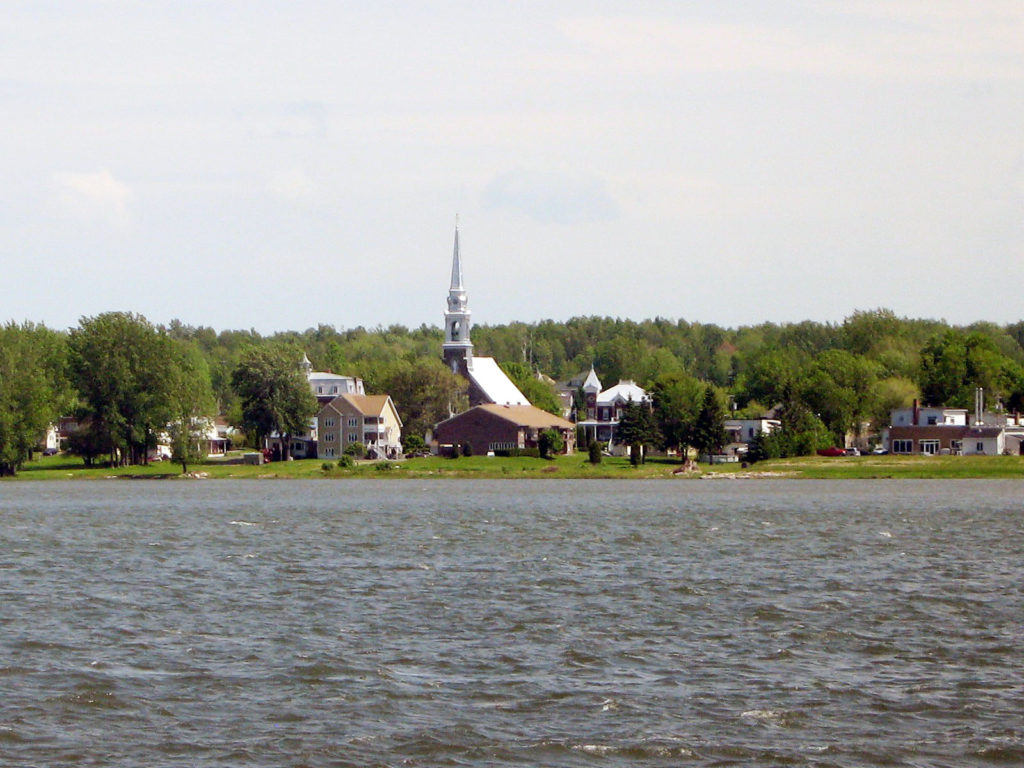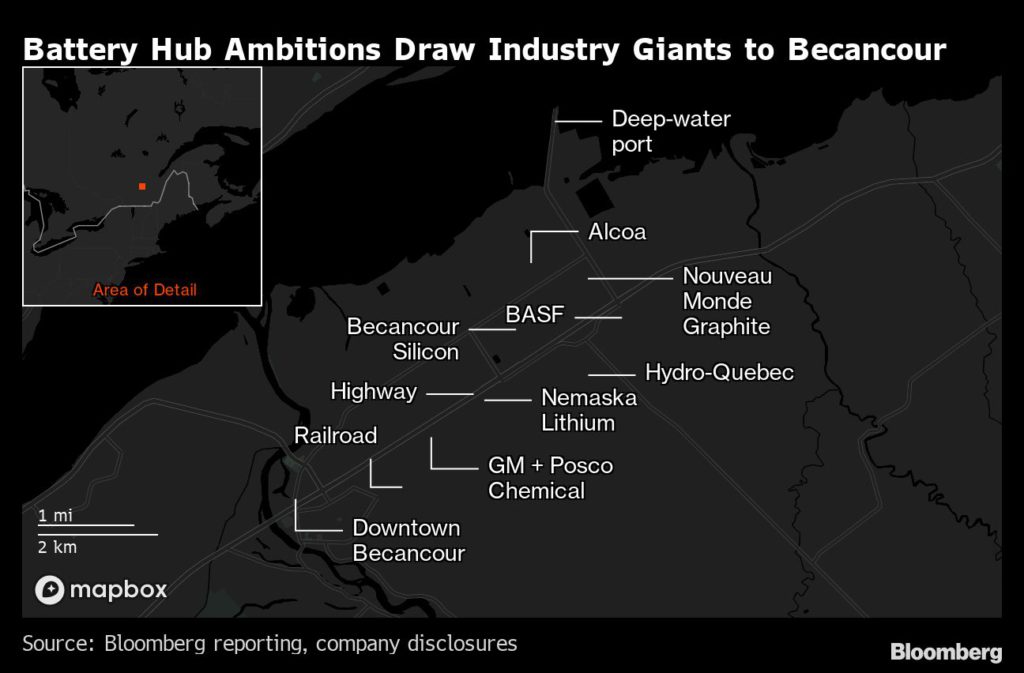EV battery heavyweights revive city’s dream of factory glory

In the race to build a North American hub to support the electric-vehicle industry and challenge China’s dominance, one tiny Quebec community is charging ahead.
Becancour is drawing corporate giants to the French-speaking Canadian province with its ambitions to make this industrial outpost, halfway between Montreal and Quebec City, a key gear for an EV battery supply chain to serve the continent.
The community of 14,000 people on the southern shore of the St. Lawrence River has attracted at least a dozen companies focused on the EV battery industry since March. Germany’s BASF SE, the world’s largest chemical maker, secured industrial land on Becancour’s outskirts for a battery materials and recycling site. Brazilian mining giant Vale SA is looking to build a nickel sulfate plant in this area. General Motors Co. has already agreed to be a customer.
Ford Motor Co. is in talks with Korean battery firms to construct a $700 million cathode factory here, while GM is partnering with South Korea’s Posco Chemical Co. Ltd. to erect a $400 million plant to produce materials for the US automaker’s EV battery platform, starting in 2025.
“Becancour really stood out as being extremely attractive, it’s kind of perfectly nestled between Canadian mineral sources and our factories,” said David Paterson, a vice president at GM Canada. “The most important benefit is Quebec’s hydroelectricity — when you compare prices of electricity, Quebec wins anywhere in North America.”

Besides cheap, renewable power that can feed an energy-intensive manufacturing industry, Becancour’s other competitive advantages include ease of access to US and European markets via major roads, railways and shipping along the St. Lawrence. The city is also close to a resource-rich region of Quebec that boasts an abundance of battery metal deposits.
Becancour is an example of how industry is pushing to regionalize supply chains to meet an anticipated surge in demand for electric vehicles. The epic shift to EVs has sparked a global rush to lock in supplies of lithium, nickel, cobalt and other key ingredients to fill future demand. Meanwhile, strained logistics and China’s dominance from mining to refining have underscored the need for several battery hubs worldwide, along with access to the raw materials needed to feed the industrial complex.
Canada already shows promise for developing a supply chain for lithium-ion batteries due to its abundant resources and environmental standards, with the nation taking second spot in a global ranking by BloombergNEF.
“China is still leading the way, but Canada has shown it is the future of the lithium-ion battery supply chain,” said Ellie Gomes-Callus, an analyst with Bloomberg’s energy and data analysis unit. “While cell manufacturing and demand are musts, having raw materials and high ESG performance go a long way.”
Quebec’s government also has coherent policies supporting development of an EV battery supply chain. The province’s investment arm acts as a venture capitalist and provides substantial backing for critical mineral projects, giving a vote of confidence and enticing private capital. Investissement Quebec takes equity stakes in some projects it considers vital and offers loans that can be partly forgiven and carry favorable interest rates.
Quebec invested in Canada’s only advanced lithium project when it took a stake in Nemaska Lithium Inc. after its 2019 collapse when prices of the silvery white metal plunged. Livent Corp., the world’s third-largest lithium producer, also invested.
Today, Nemaska is betting big on Becancour. The firm plans to open a facility within five years to produce battery-grade lithium hydroxide with materials from a mine it’s developing in northern Quebec. Involvement from the provincial government has been key.
“They provide us with the energy, provide us with the infrastructure, and back it with policies that allow us to get the funding we need,” Livent Chief Executive Officer Paul Graves said.
Becancour has tried many times since the 1960s to become a world-class industrial hub, but the global energy transition is bringing new optimism to the area even if there’s little sign of an imminent battery-fueled boom — yet. The “downtown” is just a scattering of houses and businesses peppered along a two-lane road, with the settlement quickly fading into empty fields bisected by highways. On the city’s eastern edge lies an industrial park, dominated by a 1980s-era aluminum smelter that looms over a cluster of manufacturing facilities.
Still, Quebec has spent C$350 million ($260 million) in Becancour on infrastructure to link undeveloped industrial lands owned by the government. Work has already begun, with construction crews prepping a gravel roadbed for paving. Freshly dug trenches nearby hold stacks of concrete pipes.
One beneficiary will be Nouveau Monde Graphite Inc., which bought a site for a C$923 million plant that could start producing battery materials in three years — providing it can raise enough money to build facilities. Like a prospector staking a claim, the Quebec-based firm has erected a giant roadside sign that declares “Nouveau Monde Graphite: Future Site” in French.
Becancour’s future hinges on turning words and expressions of interest into firm commitments. Some projects depend on financing that has yet to be secured, while others require approvals and permits to proceed. With several North American jurisdictions jockeying to be the next big spot for an industrial hub built on EV batteries, delays and broken promises could be a devastating blow to ambitious dreams. Understandably, skepticism lingers.
“You need serious financial backing, you need a good mix of debt and equity,” said J-P Martins, who advises firms on battery supply chain issues at consultancy Partners in Performance. “You can’t get there just with a spreadsheet and some drawings of your plant and some lab results. You need customers, you need secured supply chain.”
Quebec and Becancour are pitted against the US in attracting EV and battery investments. So far, the southern neighbor is winning. Ford said a year ago that it would invest $11.4 billion in Tennessee and Kentucky to build two EV hubs, the largest outlay in its history. GM set a company record with its $6.5 billion investment in Michigan in January.
Doubts are understandable because past projects haven’t worked out, said Donald Olivier, who heads the government entity that manages Becancour’s industrial park. “That skepticism will fade when people see the investors’ machinery coming in.”
Becancour is on the right track to be the next battery hub as long as big investment picks up, said Chris Berry, president of consultancy House Mountain Partners.
“We just need to get a lot more money coming into the space, and we need to see it soon.”
The federal and provincial government — which both have strategies to expand development of critical minerals and supply chains — are keen to make Quebec a North American supplier of EV battery components. Quebec’s investment alone in Becancour could reach C$3 billion, Economy Minister Pierre Fitzgibbon said. He’s been at the heart of discussions around the area’s development and expects to announce two to three more projects in the coming months. Still, he recognizes this small city has limits.
“Just with the announced projects, we will be at 3,000 to 4,000 workers,” Fitzgibbon said. “It will take infrastructure and housing. We have time, but we will have to work hard.”
(By Mathieu Dion and Yvonne Yue Li)
{{ commodity.name }}
{{ post.title }}
{{ post.date }}




Comments